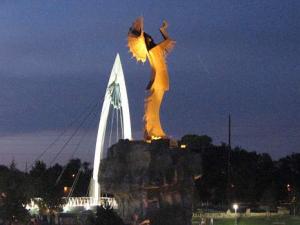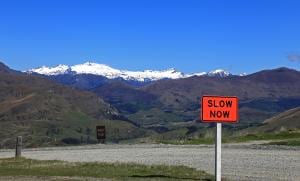So what is wisdom comes first to losers?
I looked in the mirror a while back and suddenly recognized what my wife had pointed out as “your Doctor Strange hair.”
Granted, couching this comment in a comparison to the Master of the Mystic Arts helped a great deal. Her point remained: I have two gray streaks, running horizontally from the edges of my hairline at my forehead towards the back of my head.
Gray hair isn’t new for me, honestly. The stark whiteness of these streaks, however, that’s different.
 I’d like to think that gray hair means I’ve learned a few things. It does indeed mean education, if for no other reason than I’ve been alive enough to royally screw up a few times. If education is knowledge experienced and repeated, then yes, I have learned a few things.
I’d like to think that gray hair means I’ve learned a few things. It does indeed mean education, if for no other reason than I’ve been alive enough to royally screw up a few times. If education is knowledge experienced and repeated, then yes, I have learned a few things.
Lately I’ve realized the deep need our world has for wisdom. My gray hair may mean education, but education is not wisdom. Wisdom is something deeper, at least in my mind. For the last year or so I’ve hosted a podcast around that very topic. I ask each guest to begin to define wisdom and the responses are wide and varied.
This week I came to my own conclusions about wisdom, somewhat in the moment:
I believe wisdom is for losers.
In the book of Deuteronomy, Moses stands before a nation of people. He has done this sort of thing before. In fact, the 40 year old folks in the narrative of Deuteronomy (with whom I identify) were born just a short while after Moses’ last bit of teaching outside the promised land.
I imagine Moses carried some gray in his beard, his hair.
He also carried a great deal of wisdom. The lived knowledge of failing, missing out on the land of promise because his trust waivered. He saw food come from the skies in inexplicable ways, feeding the foundling group of newly-freed slaves. Moses learned that family can cut you deep down, but they can also give you sage advice that saves you from self-destruction.
These memories make Moses who he is. In my recent book, I talk about how there is no formation without memories like these. We cannot become if we do not remember how we became who we are today.
The same is true of wisdom: wisdom is an act of remembering beauty and brutality, pain and poetry, in order to glean insight on living well in the presence.
I stare at my gray hair in the mirror. Then, I think about Moses. While I don’t rank my story as highly as his, there is something human and common about both of us.
Wisdom does not emerge until we both began to understand what it meant to lose. Wisdom, so it seems, is for losers.
I believe wisdom is the primary outcome of spiritual formation. The knowledge of how to live well, as Dallas Willard puts it, is expressed best when we align our whole selves with Jesus. The guidance and teaching of Jesus’ presence, both in the Scriptures and through His Spirit, illuminates what the wise life really looks like.
That wise life is filled with the knowledge of how to lose things. In fact, wisdom will elude us until we begin to detach ourselves form the fear of losing.
The difference between someone who is older and wiser (although not every older person is wise!) is that they understand loss differently. I remember when my daughter was young, and we said “no” to a trip to get ice cream. In her mind, there was only one chance to get ice cream.
The chance for ice cream was now and now alone; in her mind it would never come again. She feared losing her opportunity. So there was protest, tantrum, and despair.
As we grow older and wiser, we learn how to delay gratification. We learn to know, again quoting Dallas Willard, “how to be sweet and strong when we don’t get what we want.”
Yet this fear of losing is not restricted to children.
I watch adults operate in the fear of loss all the time. Of course, there is a form of fear around loss that is important. The part of our brain called the amygdala, which helps administrate our fight or flight response, is built to keep us alive. It is fueled by the fear of loss – loss of life, specifically.
The amygdala is like many vacation destinations. When it comes to the spiritual life, we need to go there sometime but we cannot live there.
Much of our thinking and wisdom about the spiritual life comes as our prefrontal cortex develops. It is the place where we process information. There we do our best thinking regarding possible outcomes and processing logically what is a threat and what is simply a perception of a threat.
Here is where we take memories of pain that turns to provision and begin to convert that memory into wisdom for the present.
Where wisdom fails is when we override the education of our memories with the fear of loss.
Sometimes it is the fear of losing status or prestige. From time to time, it is fear of losing our place of privilege or assumed value. Fear comes when we do not want to lose a relationship but we need to declare healthy boundaries.
We fear changes in our church, community, even our theology and so we wage war against the natural maturation taking place around us.
I am in a stage of life now where having served in the same church for several years, my historical knowledge is helpful. But I’m no longer the “young guy with all the potential.” My fear of losing relevance and value comes to mind even as I type that sentence. There is something within me that wants to hold on to that “status,” and if left open that fear has the power to force unwise decisions and actions.
Often, we make decisions – moral, financial, and political – out of that fear of losing.
Yet wisdom teaches us that sometimes to lose is where we find hope; where we find freedom.
I think about Jesus here. He chose the cross. I don’t believe God condemned Jesus to the cross, mandating from the manger that he be executed. We can debate the theology of that, of course. However, when Jesus says he lays his life down by his own choice and then asks in Gethsemane that something else is going on.
These two scenes among others say that Jesus knows the wisdom of loss but is wrestling with his fear of loss.
We all take this journey.
The tension of memories that wounded us deeply is that they are prime moments for us to learn how to live well. The broken pieces are often the opportunities for healing.
We are all afraid of loss. It is the most human thing we have at our disposal. Loss is something we grieve, question, and rage against. Please know, I’m not talking about the loss of a someone close to us. Though the experience has the same power, the loss of a beloved friend or partner is a different flavor of grief (and wisdom) altogether.
Yet there are losses that can be our teacher, giving us the gray hair we desperately need to shake our fear of loss. With that “gray” we act creatively, patiently, and lovingly. We deny ourselves in the moment knowing that what we need will come, though we don’t really know how. It always has, hasn’t it?
The cross is, among other things, the signpost of the wise way.
Crucifixion then resurrection, loss and then gain – these are the ways we learn to surrender first so that we might live well.
Moses took memories of loss and turned them into wisdom, invaluable and beautiful guidance for the generation to come. Jesus took memories of his Father’s love, and put them on display in the wisdom of the cross. He also made space at a table for stumbling men and women to see that body and blood in crisis – whether literally or metaphorically – is part of the journey.
The tension is where we become wise. The losing is where we learn to live well.
Wisdom, so it seems, is for losers.
(Photo by Alexander Csontala on Unsplash)











